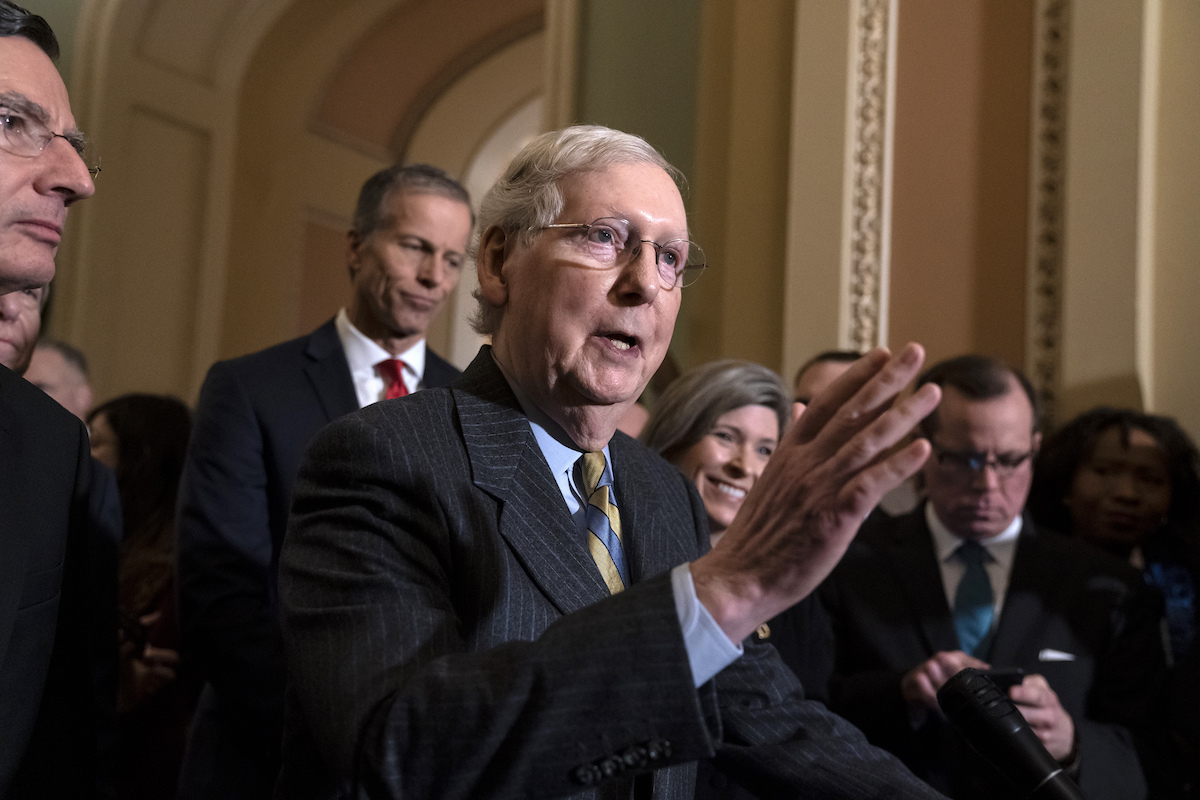

Speaker of the House Nancy Pelosi, D-Calif., leave the meeting with the Democratic Caucus at the Capitol in Washington, Tuesday, January 14, 2020. (AP Photo/José Luis Magana)
By LAURIE KELLMAN, Associated Press
WASHINGTON (AP) — The articles of impeachment against President Donald Trump don’t move to the Senate by themselves.
They are escorted by specific political stars along a tightly choreographed path from the House through the Capitol rotunda to the Senate for trial. There waits more history, pageantry and tradition of a type that’s only been seen on television once, and not since the 1999 trial of President Bill Clinton.
Like Clinton, Trump is expected to be acquitted. But the nation has never seen Chief Justice John Roberts cross the street from the Supreme Court and preside over a Senate trial. Or witnessed four Democratic presidential candidates sitting in silence, without their phones, ahead of the Feb. 3 Iowa caucuses.
Also, Twitter was not a thing the last time this happened. It’s now the accused president’s favorite bullhorn to proclaim his innocence and his fury in real time.
What to watch Wednesday as the House transmits the impeachment articles to the Senate:
At Issue
Under Speaker Nancy Pelosi, the House voted December 18 to impeach Trump on charges of abuse of power and obstruction of Congress stemming from his conduct toward Ukraine. Trump is the third president to be impeached in U.S. history. The others are Clinton and, in 1868, Andrew Johnson. President Richard Nixon resigned before the House could impeach him.
Pelosi delayed the transmission of the articles to the Senate, holding out for more specific terms of the trial.
The Crossing
Pelosi Wednesday morning named he seven House “managers” who will make the case to senators that Trump abused his office by pressuring Ukraine to investigate the son of political rival Joe Biden, and then obstructed Congress’ search for what happened.
The team is led by House Intelligence Committee Chairman Adam Schiff and Judiciary Committee Chairman Jerrold Nadler, who led the impeachment investigation and hearings. The others are Reps. Zoe Lofgren of California, Hakeem Jeffries of New York, Val Demings of Florida, Jason Crow of Colorado and Sylvia Garcia of Texas.
Pelosi’s choices suggests an emphasis on professional experience (many are lawyers) and subject matter expertise. She nodded to the 2020 elections, choosing what House members said was “geographic diversity” by appointing managers from beyond Democrat-dominated states.
And in choosing Garcia and Crow, she acknowledged the class of freshmen lawmakers who helped flip the House in the 2018 elections. Crow’s appointment, too, is a nod to the seven national security freshmen who had resisted impeaching Trump, but then wrote an op-ed calling for it after the Ukraine scheme broke.
A Democrat familiar with how most managers were chosen said they were notified in a two-step process. First, they were told they were being considered. Then they were summoned to Pelosi’s office to meet with the speaker one-on-one. Inside, Pelosi told them she had chosen them for the high visibility role. The person spoke on condition of anonymity to convey the order of developments.
Later Wednesday, the whole prosecution team will line up behind House Sergeant-at-Arms Paul Irving and House Clerk Cheryl Johnson, who will be holding the articles in folders. The procession will walk through National Statuary Hall, past Pelosi’s office, across the Rotunda and to the doors of the Senate.
The managers will return to the House until the Senate admits them.


Senate Majority Leader Mitch McConnell, R-Ky., joined from left by Sen. John Barrasso, R-Wyo., Majority Whip John Thune, R-S.D., and Sen. Joni Ernst, R-Iowa, meets with reporters as the House prepares to send the articles of impeachment against President Donald Trump to the Senate, at the Capitol in Washington, Tuesday, Jan. 14, 2020. (AP Photo/J. Scott Applewhite)
Furniture and Oaths
The Senate then considers some mundane-sounding details, as well as some historic ones, according to the precedent of Clinton’s impeachment trial.
First, they’ll consider resolutions on such things as how to arrange the chamber to accommodate the prosecution and defense teams, and who can watch from the galleries. Then, according to a memo circulated among senators, comes a series of formalities, including the reception of the House managers.
By the end of the week, the managers are expected to exhibit the articles of impeachment. Roberts and the senators will take their oaths. And the senators will sign an oath book used since 1986 for presidential and judicial impeachment trials that has been stored at the National Archives.
The Senate Convenes as a Court
“Hear ye! Hear ye! Hear ye! All persons are commanded to keep silent, on pain of imprisonment, while the Senate of the United States is sitting for the trial of the articles of impeachment.”
So proclaimed James Ziglar, then the Senate sergeant-at-arms, at Clinton’s trial in 1999.
Senate rules say the trial then begins, and runs six days a week —not on Sunday— until it’s resolved. But senators could vote to change the schedule.
Arguments in Trump’s trial begin next Tuesday, according to Senate Majority Leader Mitch McConnell.


Protesters display signs and sing in front of the White House, Tuesday, January 14, 2020. (AP Photo/Steve Helber)
No Dismissal
Trump has said he wants a full trial with witnesses while also suggesting he’d favor a dismissal.
But it takes 51 of 100 senators to do almost anything during a trial, and even Republican senators have rejected the idea of a dismissal.
Witnesses?
The jury is out on whether the Senate calls witnesses, but it’s possible.
Former national security adviser John Bolton has agreed to testify if subpoenaed, and some Republicans have been meeting privately to guarantee that witnesses can be called. With a 53-seat Republican majority, four GOP senators would have to vote with all Democrats to reach the 51-vote threshold.
On this, watch GOP moderate Sens. Susan Collins of Maine, Mitt Romney of Utah, Lisa Murkowski of Alaska and Lamar Alexander of Tennessee.
Any plan for witnesses would likely involve depositions and testimony from people called by Republicans and Democrats.
Trump has said he wants the Senate to call Pelosi and Schiff, but that’s highly unlikely.
During the Clinton trial, former White House intern Monica Lewinsky was deposed privately but not called to testify. She and Clinton had had an extramarital relationship, they both said.
The Four
Senators are fond of talking and any politician wants to stay connected to constituents. So the impeachment trial rule against speaking or consulting their phones on the Senate floor has the potential to make all of them cranky.
None moreso, however, than the four Democratic senators forced to decamp from Iowa less than three weeks before the election’s leadoff caucuses. Look for Sens. Elizabeth Warren of Massachusetts, Bernie Sanders of Vermont, Amy Klobuchar of Minnesota and Michael Bennet of Colorado to send surrogates to Iowa or make short trips back and forth.
“I’ve told them this trial is your responsibility as senators and scheduling is not going to influence what we should do,” Senate Democratic leader Chuck Schumer told The Associated Press in an interview last month. He said none of them objected. “There are benefits of running as a senator,” Schumer added, “and there are liabilities.”


